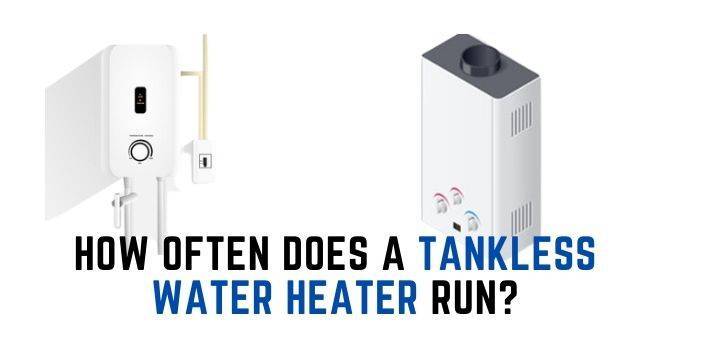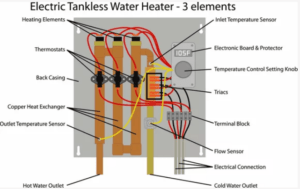Tankless water heaters have gained significant popularity as an energy-efficient and cost-effective alternative to traditional water heaters.
These systems are designed to provide hot water on demand, eliminating the need for a storage tank. However, understanding how often a tankless water heater runs and optimizing its operation are key to maximizing its efficiency.
In this article, we’ll explore the factors that determine how often a tankless water heater runs, its benefits, drawbacks, and tips for choosing and maintaining one.
One of the most efficient ways to heat water is to install a tankless water heater. These units can heat up a large amount of water, at a high rate of speed, with the least amount of energy.
Does a tankless -water heater works?
How Often Does a Tankless Water Heater Run?
A tankless water heater operates only when hot water is needed. Unlike traditional water heaters that continuously heat stored water, a tankless system activates when you turn on a hot water tap. Here’s a breakdown of how it works
1. Demand-Based Activation
- When a hot water tap is turned on, cold water flows through the heater’s system.
- Sensors detect the flow and trigger the heating element (electric or gas burner) to heat the water.
- The water is then delivered at the desired temperature almost instantly.
2. Factors Influencing Frequency of Operation
- Household Hot Water Demand: The more often you use hot water (e.g., showers, dishwashers, laundry), the more frequently the system will activate.
- Size of the Unit: A properly sized unit can handle multiple simultaneous uses efficiently, while an undersized one may struggle and activate more often.
- Water Temperature Settings: A higher set temperature may require more frequent cycling, especially in colder climates where incoming water temperatures are lower.
- Faulty Components: Issues like a malfunctioning thermostat or blocked pipes can cause unnecessary cycling.
Benefits of a Tankless Water Heater
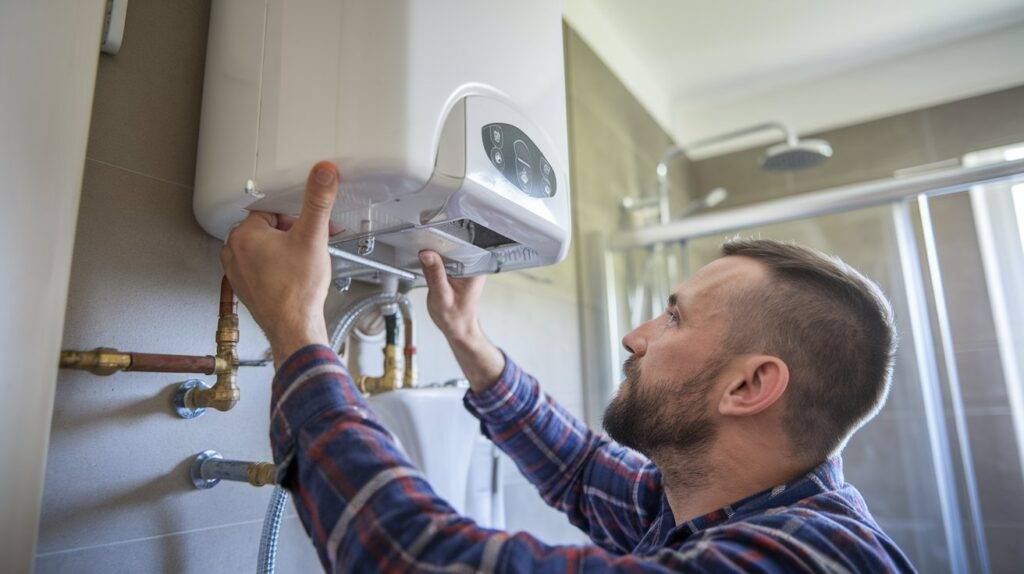
1. Energy Efficiency:
Tankless water heaters eliminate standby energy loss by heating water only as needed. According to the U.S. Department of Energy, homes that use 41 gallons or less of hot water daily can achieve energy savings of 24–34%.
2. Space-Saving Design:
These systems are compact and can be mounted on a wall, freeing up valuable storage space compared to bulky traditional water heaters.
3. Longevity:
With proper maintenance, tankless water heaters can last up to 20 years or more, outliving their tank counterparts.
4. Consistent Hot Water Supply:
As long as the unit is properly sized, you’ll have a continuous supply of hot water, ideal for households with high water usage.
Related post: Whole House Electric Tankless Water Heaters
What is a tankless water heater?
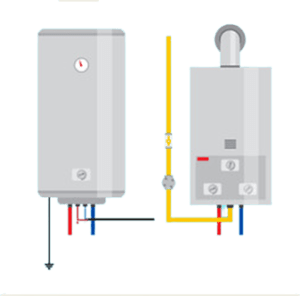
A tankless water heater, also known as an on-demand water heater, heats water only when needed, without storing it in a tank.
When you turn on a hot water tap, cold water flows through the unit, where it’s rapidly heated by electric elements or a gas burner.
This efficient system eliminates standby energy loss, provides a continuous supply of hot water, and saves space with its compact design. It’s ideal for reducing energy costs and optimizing hot water usage at home.
Drawbacks of Tankless Water Heaters
1. Higher Initial Cost:
Tankless systems can be more expensive to purchase and install compared to traditional water heaters.
2. Potential for Inconsistent Flow
If multiple appliances demand hot water simultaneously and the unit is undersized, the flow rate may decrease.
3. Susceptible to Freezing
In colder climates, outdoor units may require freeze protection to avoid damage.
4. Installation Challenges
Retrofitting a tankless water heater into an existing system can involve significant changes to plumbing or electrical setups.
How to Choose the Right Tankless Water Heater
- Determine Your Hot Water Needs
- Calculate the flow rate (gallons per minute or GPM) needed for simultaneous usage.
- For example, a shower may require 2.5 GPM, and a dishwasher might need 1.5 GPM.
- Consider Your Climate
- In colder regions, incoming water temperatures are lower, requiring a heater with a higher temperature rise capacity.
- Energy Source
- Choose between electric and gas models based on availability and energy costs in your area. Gas models tend to have a higher flow rate, while electric models are more compact and easier to install.
- Look for Certifications
- Ensure the unit meets energy efficiency standards and has safety certifications, such as ENERGY STAR ratings.
Maintenance Tips for Optimal Performance
- Descale the System Regularly
Hard water can cause mineral buildup, reducing efficiency. Descaling every 6–12 months is recommended. - Inspect Components
- Check the temperature and pressure relief valves regularly to ensure safe operation.
- Inspect and clean the inlet screen filter to avoid blockages.
- Monitor Temperature Settings
Keep the temperature set to 120°F to balance efficiency and prevent scalding. - Install a Water Softener
In areas with hard water, a water softener can help reduce mineral buildup.
Common Issues and Troubleshooting
- Heater Runs Too Frequently:
- Cause: A dripping faucet or minor leak can trigger the system.
- Solution: Fix leaks promptly and check for faulty fixtures.
- Insufficient Hot Water:
- Cause: The unit may be undersized or clogged with mineral deposits.
- Solution: Upgrade to a larger unit or perform regular descaling.
- Fluctuating Water Temperature:
- Cause: Simultaneous use of multiple fixtures or a blocked heat exchanger.
- Solution: Upgrade to a higher GPM unit or clean the heat exchanger.
Advantages of Electric Tankless Water Heaters
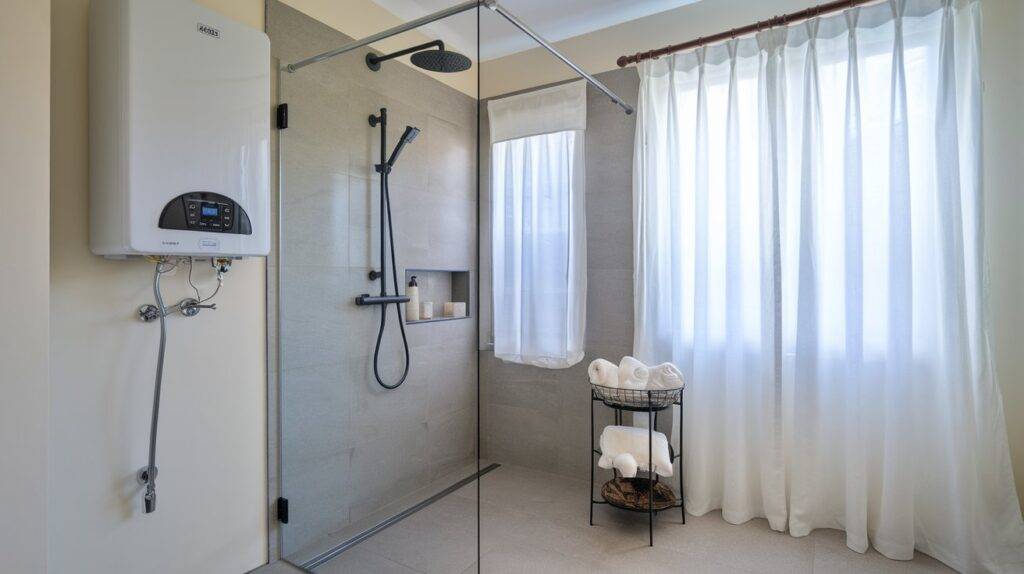
Environmentally Friendly
Electric tankless water heaters are eco-friendly as they don’t produce emissions, unlike gas heaters. They contribute to reducing pollution and support efforts to protect the environment.
Space-Saving
Unlike traditional tank heaters, which are large and bulky, tankless water heaters are compact and can be easily mounted on a wall. Their slim design helps save valuable space and seamlessly integrates with your home’s décor.
Improved Energy Efficiency
Tankless water heaters are significantly more energy-efficient. According to the Department of Energy, homes using less than 41 gallons of hot water per day can save 24–34% on energy bills.
Since these heaters only heat water when needed, they don’t waste energy keeping a tank of water hot, helping reduce your energy costs.
Installation
Proper sizing and installation are key to optimizing the efficiency of your tankless water heater. The number of units needed depends on your home’s water supply and household size.
Installation is easier during new construction but can also be done in existing structures with some adjustments.
Safety Features
Tankless water heaters are safer than traditional models because they don’t store water, preventing the growth of bacteria like Legionella.
Maintaining the proper temperature range ensures water safety, reducing the risk of contamination.
FAQs
1. How does a tankless water heater work?
A tankless water heater heats water on demand. Cold water flows through the system when a hot water tap is turned on, and heating elements (electric or gas) instantly heat the water. There’s no need for a storage tank.
2. How often does a tankless water heater run?
It only runs when there’s a demand for hot water, such as when you turn on a faucet or shower. Unlike traditional water heaters, it doesn’t continuously cycle to maintain stored water temperature.
3. Can a tankless water heater run out of hot water?
No, it provides a continuous supply of hot water. However, the flow rate may decrease if multiple fixtures are used simultaneously and the unit is undersized.
4. Is a tankless water heater energy-efficient?
Yes, it is highly energy-efficient because it eliminates standby energy losses. It can save 24–34% on energy costs for households using 41 gallons or less of hot water daily.
5. Do tankless water heaters require maintenance?
Yes, regular maintenance is essential. Descaling every 6–12 months prevents mineral buildup, especially in hard water areas, and keeps the system running efficiently.
6. Are tankless water heaters expensive to install?
The initial installation cost is higher than traditional heaters due to additional plumbing or electrical upgrades. However, the long-term energy savings often outweigh the upfront costs.
7. What’s the lifespan of a tankless water heater?
With proper maintenance, a tankless water heater can last up to 20 years or more, which is longer than the lifespan of most traditional water heaters.
Verdict
A tankless water heater is an excellent choice for households looking to enhance energy efficiency, save space, and ensure a steady supply of hot water on demand.
However, its performance and cost-effectiveness largely depend on proper sizing, installation, and maintenance.
While the initial investment may be higher compared to traditional water heaters, the long-term energy savings and durability often justify the expense.
For homes with moderate to high hot water usage, a tankless water heater can significantly reduce energy bills and environmental impact.
To get the most out of your unit, ensure it’s appropriately sized for your household’s needs, perform regular maintenance to prevent scaling, and follow safety measures to avoid operational issues.
Conclusion
A tankless water heater offers numerous advantages, including energy efficiency, a compact design, and a consistent hot water supply.
However, to ensure optimal performance, it’s crucial to understand how often it runs, choose the right unit for your needs, and maintain it properly.
By following the tips outlined in this guide, you can enjoy the benefits of a tankless system while minimizing potential drawbacks.
- 15 Must-Have Products to Start Your Cozy Outdoor Kitchen - July 15, 2025
- 30 Cozy Outdoor Kitchen Ideas You Can Try in Any Backyard - July 14, 2025
- 27 Cozy Dark Bedroom Inspiration Ideas for Warm and Relaxing - July 13, 2025

